- Home
- Deborah Smith
Alice At Heart Page 15
Alice At Heart Read online
Page 15
“That’s just one of many things I intend to understand.”
She cleared her throat and clasped her hands in front of her as if she were ten years old, practicing for her first formal dance. “Could we hold a polite conversation and not contemplate our mysteries?”
“I doubt it.”
“I’ll try, at least. Griffin, you’re looking much healthier.” Her voice became dulcet, her eyes earnest, her mouth pursing slightly in a smile, the richest soft red. “And I’m glad to see you again.”
The quiet sensuality in her, the kindness, the honest caress of his name on her tongue made him drunk. He could do no better than a gruff laugh. “So I’m not Blackbeard?”
Silence. She stared up at him woefully. Decorum was hopeless. If he wanted to understand his own mysteries as well as hers, he would have to lure her to him as bluntly as her family had lured his for two centuries. A kind of revenge. The light grew somber between them. “Come with me, Ali,” he said gently, “and I’ll show you where your mother met your father.”
Bittersweet excitement filled her eyes, and he knew he had her.
Or that she had him.
Of all wonders, I had never been on a boat before. As Griffin skimmed the fast ketch along the bay’s wooded shoreline, I gave in helplessly to a new passion. Sailing. I sat on the bow with my bare legs curled over the side, the skirt of my dress jammed unceremoniously between my thighs, my face turned into the tangy, moist wind. Behind me and slightly below the deck, Griffin stood in the cockpit as grandly as a pirate captain, his hands touching the Sea Princess’s handsome wooden wheel here and there, coaxing, cajoling, seducing the boat, the wind, the water, me. I wouldn’t look back at him, though I wanted to. I could barely breathe when I gazed into his eyes. I don’t doubt Griffin always invokes a certain raw thrill in people, always enjoining them to challenge the rhythm of the ocean with him, to admit that yes, by God, a man can make waves and women dance for him.
I did not dance, but I might as well have.
We left the bay, then raced along the open ocean for a mile or so to a place where the shoreline gave way to broad, saltwater marsh. Griffin turned the boat into a narrow channel between a sea of water and green grass. He leapt onto the bow deck and expertly furled the various sails. I pivoted to watch him work, drinking in the long-legged, broad-shouldered grace with which he moved. He was recovering from his injuries well, and the scar on his face had become a ruddy decoration, curved from cheek to jaw like a crescent moon.
“We’ll use the motor from here on,” he said, looking down at me with a background of blue sky and white clouds behind him.
I nodded, gazing up at him, hypnotized, pouring out reckless waves of arousal and resistance submerged in my old childhood fear of abuse.
God help me. He heard that plaintive song before I realized I was singing it. He went very still, frowning, searching my eyes for more clues, absorbing my bleak music too quickly for me to draw back in silence. Sorrow and surprise crossed his face, ending in a gaze so hard it would have chilled me, except that I felt his anger wrapping around me like a protective cloak. He was mad for me, not at me.
Without touching me, he took me in his arms. I wish I had been there when they hurt you.
I shut my eyes, luxuriated in his vow, sank down in the depths of that extraordinary moment, then cautioned myself and rose for air, trembling. “I didn’t know how to help myself,” I said, “and I didn’t know how to call for help.”
“Is that what we’re doing, Ali? Calling each other for help?”
Ali. He named me by his own shorthand, as if I had always been some special person, known to him but unknown to myself. I couldn’t speak. I was overwhelmed with gratitude and adoration. My emotions affected him deeply—I could see the tortured discipline in his face, hear the desperate restraint humming inside his mind. “You’d best step away,” I whispered. He nodded.
He went back to the ketch’s controls, cranked the engine, and we motored quietly onward. I clenched my hands in my lap and faced the far side of the marsh, where our small waterway disappeared into deep forest. When we reached that place, we were suddenly in a new world, shaded by oaks and maples, bald cypress and magnolias, traveling on a small, sandy river with water as dark as tea. Tall herons waded in the shallows, fishing. Around a wooded bend, the forest opened. A lovely little dock appeared at the edge of broad lawns and stately oaks. I put a hand to my heart as I saw low, simple but handsome buildings of gray coquina with old terracotta roofs. Several dozen small cabins lined winding walkways of crushed shells. A pavilion overlooked the river and a beautiful little chapel.
My heart twisted. So this was the church retreat where my mother had spent her summers working as a counselor at a children’s camp. Where she and eighty-five-year old Orion Bonavendier had met when she was seventeen, and where she, at least, had fallen in love. And where now, as Griffin slipped the sailboat into a berth beside the docks, I stared at a weathered brass plaque fixed to the dock’s pilings. Sweetwater Haven. Dedicated by Griffin Randolph to the memory of his parents, Porter and Undiline Randolph.
I turned and looked at Griffin, stunned.
“I own the whole place,” he said.
Griffin and I sat on a bench before the chapel. He told me this church camp is a Randolph legacy, one of many charitable projects the family owns or controls along the Georgia coast. Undiline Randolph doted on it and spent a considerable amount of her time here, supervising the construction of the pavilion and the docks, among other projects, and charming the children with her Scottish accent and her fairy tales about the ocean. He opened a mysterious little folder he’d carried from the sailboat. “This is for you,” he said and handed me a small photograph. “It was taken the year before the Calm Meridian sank.”
I uttered a soft cry of surprise. Sitting on this same bench was his mother, Undiline—a tall, smiling redhead surging with sexuality even in a demure 1960s swimsuit, and Griffin—a stalwart, black-haired child, already muscular and lean in swimtrunks, grinning as he clasped her hand—and my own mother, laughing, beautiful, an auburn-haired young woman looking wholesome and strong in light shorts and a white blouse with the camp’s name over her right breast. Griffin held her hand, too. He was safe between his own mother—and mine.
“You knew my mother. You met my mother. Look at her. Oh, look at her,” I whispered, huddling over the photograph.
“I don’t remember her. I remember playing here, though. My mother brought me here a lot while my father was away in Savannah, working. I loved this camp.”
I raised my head and gave him a tearful smile, then returned to gazing at the picture. “You touched my mother. You held her hand. I know I’m being maudlin, but that connection—I’m glad for it—and I envy it.”
He held out his hand. “It was this simple.”
I laid my hand inside his, and he closed his fingers over mine. Across all those years, sitting on the same spot as my mother, I held Griffin Randolph’s hand, too. Mother, look what you’ve given me.
His eyes shuttered, Griffin looked down at our linked fingers. His grip was careful, but mine was tight, emotional. He drew the pad of his thumb along the back of my hand, tracing the course of a tender blue vein. “I’m trying to make you so grateful you’ll do anything for me,” he admitted.
I looked at him sadly. “I know.”
“Hello, I didn’t realize you were here yet!” a woman called from the door of the main building. “I’m coming right now!”
Griffin and I sat back and slipped our hands apart.
“Your mother was always willing to listen. She opened her heart and never turned anyone away, and I believe, if she’d lived, that she would have bucked the system and become a minister, as I did. Your mother told me once that she’d been raised to take what God gave her and never question the rules of man, but she was full of questions, Alice, and I admired her for asking them—and for listening for answers the rest of us might miss.”
Dr. Lucil
le Abernathy, minister of the gospel and president of Sweetwater Haven’s board of directors, had become good friends with my mother during several summers they worked together as counselors. Now a stocky and energetic southern grandmother who wore a clerical collar with her white Camp Sweetwater T-shirt, she spoke to me kindly over iced tea and crisp gingersnaps at a picnic table under the oaks as Griffin listened.
“She was crazy about children, and they loved her back,” Dr. Abernathy went on, breaking cookies with ecumenical briskness, feeding half to a flock of wild mallards that crowded around my feet. She gave the ducks bewildered glances as they rubbed their bills on my bare legs. I stroked their heads and curled my webbed toes under.
Griffin watched the strange alchemy between the ducks and me with somber interest, cataloging yet another bit of evidence in his quest to catalog me as well.
I gathered my courage and asked a hard question. “How well did you know my father?”
“He’d come by regularly as a favor to Mrs. Randolph”—a nod to Griffin indicated his mother—”to teach swimming lessons. I don’t care how frightened of water a child was, if we turned him over to Orion Bonavendier, before long that child would be swimming like a fish.” She smiled. “All of us were in love with him—every female at the camp, including little girls and old women. He had a Rhett Butler voice, gray-green eyes, and beautiful silver hair—not to mention, excuse me, but a fine, hmmm, physique. He was old, but there was nothing old about him. He was an amazing man to look at, to listen to, to watch.”
“Did my mother ever say anything to you about their relationship?’
“Not much. I suspect they were only together one time.”
“Once? One night?”
Dr. Abernathy nodded. “We took a boatload of children to Sainte’s Point for a day at the beach. Mrs. Randolph—Undiline—used to host beach parties for the camp’s children there. A storm came up and we spent the night. Bunked the children in various bedrooms at that incredible mansion, and your mother and I shared a room.” Dr. Abernathy paused. “I woke up in the middle of the night and she was gone. When we came back here the next day, she was different. Distracted, happy, sad, excited, depressed. But not . . . hurt . . . you understand. Just changed. Mr. Bonavendier came to see her that day, and they went for a walk. He was obviously worried about her. After he left, I found her sitting in the chapel. She looked peaceful. Radiant. She said at the end of the summer she was going to find a job in Bellemeade and a place to live. That she was never going back to the mountains, and she was breaking off her engagement to the young man she intended to marry up there. That she was in love with Orion Bonavendier, and she expected to love him forever. I said, ‘Have you lost your mind? What has he done to you?’ She just looked at me and said, ‘He’s taught me how to breathe and hear voices in the water.’”
Dr. Abernathy looked at me sadly. “She was so idealistic, so . . . silly that way. But she meant it, I could tell. She was seventeen years old, and nothing and no one was going to stop her from staying near the man she loved. Orion Bonavendier.” Dr. Abernathy touched my hand. “A week later, your father drowned during a swim off the shores of the island.”
I gasped. “My half-sisters told me he drowned, but I had no idea it was so soon after he . . . he knew my mother.”
“No one knows what happened. He was an incredible swimmer. Maybe he had a heart attack. When she heard the news about his death, your mother collapsed. She had some kind of nervous breakdown. We found her in her cabin. She had a pair of scissors. She’d cut off all her hair, and . . . bound it in a tight braid, about a foot long. ‘I’m giving this to Orion,’ she kept saying. ‘I have to. It’s a tradition in his family. I have to.’ She was out of her mind. Her family had to come get her. That was the last time I saw her, Alice. When they took her back to the mountains.” Dr. Abernathy couched my hands in both of hers. “I wish I had known she was pregnant. I’m sorry you grew up not knowing how wonderful she was.”
After a moment I found my voice. “I feel that I do now. Thank you.” I didn’t understand what my mother had meant about her hair, about some Bonavendier tradition none of the sisters had yet described. But I knew what it meant to shear yourself in mourning for the person you wanted to be.
“You look like her, around the mouth, and in the shape of your face,” Dr. Abernathy went on kindly. “And the soul in your eyes. You’re a beautiful young woman.”
“I wish I’d had a chance to look into her eyes.”
“Look in the mirror. You’ll see her. And your father, too.”
A chapel bell began to chime. Dr. Abernathy exhaled. “Sorry. I have to go.”
“Thank you for speaking with me.”
“Words are easy.”
We rose and walked toward the docks. Griffin had said nothing during all this, and he kept discreetly at a distance beside Dr. Abernathy and me. When we stopped at the docks, she held out a plump, strong hand to him and smiled when he took it, bowed over it, and kissed it. I knew what he made her think and feel because I felt it, too. Scars and all, this man can make women fall in love with him as easily as any merman can. I pushed that thought aside.
“Charmer,” she accused. “But bless you for the money to build the new gym.”
He nodded and shrugged off the admiring look she gave him. “My mother loved this place.” As if nullifying his own good works, he pivoted toward me and said quietly, “So now you realize my mother introduced your mother to your father. For better or worse, it was her doing.”
A small breath froze inside me. “Better or worse remains to be seen, but if you’re wondering if I might blame your mother for something, what would it be? The circumstances that led to my own birth? No. I’m glad to be alive.” That stunned me, and I had to think about it a moment. I was actually glad to be alive.
He absorbed my bittersweet look of wonder and scowled. “That’s the one thing that makes it all worthwhile,” he said. “You.”
I lost my heart just looking at him, and him at me.
Dr. Abernathy broke the spell by tossing the remnants of gingersnaps to the ducks. I twisted away from Griffin in self-defense. A tingle went up my spine, and a gift of love, clear and pure, came to me. “Dr. Abernathy, about your grandson, the one who has the tumor.”
Her mouth popped open. “How did you know about him?”
I shook my head. “I’m just telling you. He’ll be fine after the surgery.”
Her eyes filled with tears. I avoided Griffin’s intense scrutiny, which felt like fire on my skin. Red-faced, I climbed into Griffin’s sailboat without another word, sat down on the bow, and faced forward. After a moment, Griffin cranked the engine, and we began to ease away from the weathered docks of beautiful Sweetwater Haven.
“Alice!” Dr. Abernathy called to me, and I looked back at her. She stood at the dock’s end, stubby and T-shirted, with fat little knees showing beneath old khaki walking shorts and her face flushed with tearful conviction above her white clerical collar, a huggable speaker of the gospel, as wise as an old choir melody. My mother’s friend and now mine. “People say the Lord speaks to Bonavendiers in mysterious ways,” she called. “Just be sure to keep listening!”
I waved to her, neither confirming nor denying.
And not daring to look back at Griffin.
She trusts me. Either I believe in her or I don’t, but she trusts me with the choice.
Griffin told himself he should feel victorious—he had her wrapped up; he could use her against her sisters and their secrets. But instead he felt dirty and depressed. No time like the present for a little tough conversation.
He turned the Sea Princess toward open water and set a course that would curve out beyond the shoals of Sainte’s Point, where the ocean floor dropped suddenly into starker depths.
Ali got up from the bow, the wind tossing her fluid dress around her and slicking the material behind her as if she’d grown wings. She pivoted and studied him hard, then made her way gracefully to the cockpit
and stepped down beside him. Her gaze never left him. “If you’re going to take me someplace I won’t like,” she said, “then at least give me a fighting chance to learn the way.”
He stepped back from the wheel. “Take it. I’ll show you how.”
She slipped between him and the wheel, faced forward, and lightly rested her hands on the wooden spokes. He stood close behind her, not quite touching her. She cleared her throat. “I know a lot about boats from reading. I’ve sailed every kind of boat on every kind of waterway—at least in my imagination.”
He bent his head next to hers. Her auburn hair caressed his scarred cheek. He lifted a hand, tucked her hair aside, then moved his lips close to her ear. “Bear away before the wind.”
“Aye-aye, captain.” She turned the wheel.
“Keep the sail full. No sudden moves. If you do it right, you can use just your fingertips.”
She spread her hands on the spokes so only the pads of her fingers rested against the polished wood. Her breathing seemed to merge with the rhythm of the sailboat, rising and falling. Griffin inhaled with her, inhaled her scent, imagined the warmth of her back and hips against his chest and thighs, and did not lift a hand to stop it when her hair curled in soft waves across his face again. “That’s it,” he said. “You’re a natural.”
“Except I don’t know where we’re going.”
“If you’re afraid, I’ll take you back.”
“Nothing on the water frightens me.”
There was a clear challenge in her voice. He moved closer to her, chest to back. “Then I envy you,” he said. The ketch surged unevenly. He placed his hands over hers and fitted his arms along her arms. “Steady. Dead ahead.”
She shuddered and pulled her hands from his, twisting inside the cusp he made with his arms, almost frantic. But when she looked up at him, she wasn’t asking for escape. What had been cased in defiance became surrender.
“I’ve never,” she said.
“I know.”
She kissed him. She fitted her untested mouth to his gently, as if he might break, something a woman had never suspected of him before. She tasted him, opened him, held him still with that kiss, as the ocean passed beneath their feet without any threat at all. He found himself trembling against her. She clenched her hands together against his chest. The kiss deepened. He touched his tongue to her lips, then between them, and she returned the caress, the stroking so quick it was like her breath licking him, and nearly brought him to his knees.

 Legends
Legends Hold on Tight
Hold on Tight Just a Little Bit Guilty
Just a Little Bit Guilty The Beloved Woman
The Beloved Woman Alice At Heart
Alice At Heart Heart of the Dragon
Heart of the Dragon Critters of Mossy Creek
Critters of Mossy Creek Diary of a Radical Mermaid
Diary of a Radical Mermaid Caught by Surprise
Caught by Surprise Stranger in Camelot
Stranger in Camelot At Home in Mossy Creek
At Home in Mossy Creek Charming Grace
Charming Grace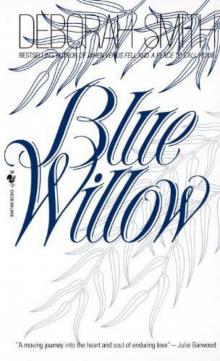 Blue Willow
Blue Willow The Pickle Queen: A Crossroads Café Novella
The Pickle Queen: A Crossroads Café Novella On Bear Mountain
On Bear Mountain The Biscuit Witch
The Biscuit Witch Sara's Surprise
Sara's Surprise More Sweet Tea
More Sweet Tea The Apple Pie Knights
The Apple Pie Knights The Silver Fox and the Red-Hot Dove
The Silver Fox and the Red-Hot Dove Sweet Hush
Sweet Hush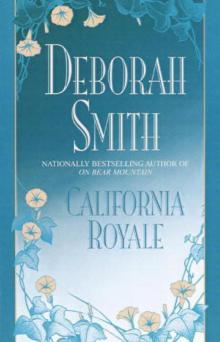 California Royale
California Royale Hot Touch
Hot Touch Miracle
Miracle The Stone Flower Garden
The Stone Flower Garden A Place to Call Home
A Place to Call Home Silk and Stone
Silk and Stone Honey and Smoke
Honey and Smoke Jed's Sweet Revenge
Jed's Sweet Revenge Silver Fox and Red Hot Dove
Silver Fox and Red Hot Dove The Kitchen Charmer
The Kitchen Charmer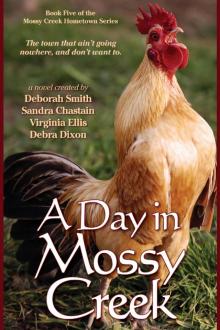 A Day in Mossy Creek
A Day in Mossy Creek Never Let Go
Never Let Go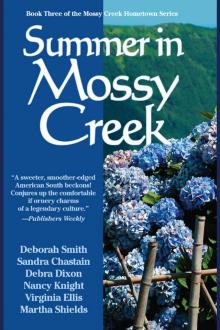 Summer in Mossy Creek
Summer in Mossy Creek On Grandma's Porch
On Grandma's Porch The Crossroads Cafe
The Crossroads Cafe Follow the Sun
Follow the Sun The Yarn Spinner
The Yarn Spinner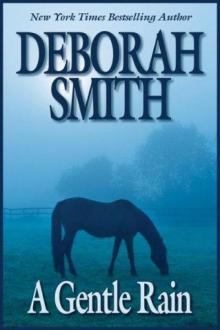 A Gentle Rain
A Gentle Rain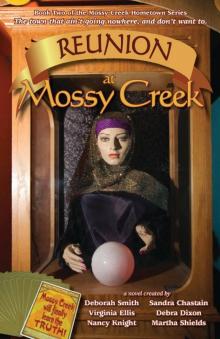 Reunion at Mossy Creek
Reunion at Mossy Creek